Charter Flights...
 | 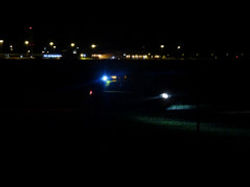 |  | 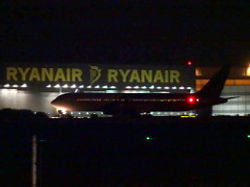 |
|---|---|---|---|
 | 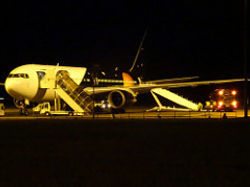 | 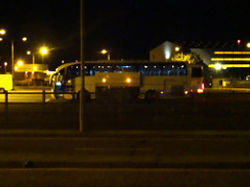 |  |
 |  |  |  |
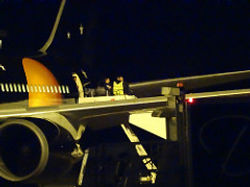 | 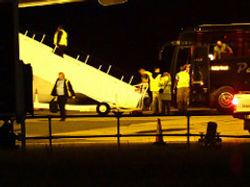 |  | 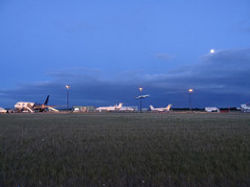 |
 |  |
The UK Home Office has a regular practice of forcibly removing up to 100 people on privately chartered ghost flights that leave from an undisclosed location in the middle of the night. On the basis of previous charter flight reports from Stansted, it is assumed the company contracted to operate this flight is Titan Airways.
In the few weeks leading up to a charter flight, hundreds of individuals that sign on regularly at a Home Office reporting centre in their local area as part of either bail or temporary admission requirements or because they have an immigration decision pending, are detained. This is a deliberate act to prepare for an upcoming charter. Charter flights are currently used to send people to West African, mainly Nigeria and Ghana, Pakistan and Albania. In the past flights have also been used for Afghanistan, Sri Lanka, Jamaica and more. Many individuals placed on charter flights have ongoing immigration cases, many cannot afford to pay the huge legal fees to regularise their stay, and most have children and partners here and strong ties to the UK. For years detainees and their families have called
For raised public awareness of how they are treated on charter flights and also how the flights are strategically used.. One detainee stated: “It’s about 90 per cent of us that don’t want to go, the other 10 per cent don’t want to go either but they are tired of being humiliated so they say they are ready.”
What is a charter flight, and who is on one?
“Charter flights” refer to the well-established Home Office practice of hiring a whole (private) aircraft to forcibly remove multiple people against their will at one time – most commonly around 60-80 people (but can be up to 100). The only people on these flights are deportees* and security guards, without independent monitoring or documentation of what takes place on the way to the airport, during the flight, and after landing. Charter flights have been known to stop off in other countries within the EU, such as Belgium, to pick up more detainees on the way. These mass deportations are often used to forcibly remove people to countries which receive few commercial flights from the UK – because they are countries it is considered especially dangerous to fly to – and therefore countries which people may be especially scared to return to, demonstrated by the story of one woman who swallowed all of the medication she had instantly upon landing in Nigeria.
Bimonthly charter flights to Nigeria and Ghana (named “Operation Majestic” by the Home Office) are often made up of a mixture of people who have had their asylum claims rejected by the Home Office (whilst some still have ongoing claims), people who may have spent their whole life in the UK but lack British citizenship, and, after being convicted for a crime and serving a prison sentence longer than 12 months, are subsequently transferred to immigration detention and given deportation orders to a country they know nothing about and may have never lived in, and people who are labeled as “overstayers” by the Home Office.
Many on charter flights have been given the “right” to appeal once they have been deported, which is used by the Home Office to in part to justify the use of charter flights.
From Roots to Return founders' experiences supporting immigreation detainees it has been observed that individuals placed on charter flights range from people who have lived in the UK for over 20 years with their entire family to individuals who have had their asylum claims refused. Many individuals placed on charter flights at present have spend most of their lives in the UK, prior to the determination that Detained Fast Track was unlawful, however, many more were refused asylum seekers. Despite this change what remains unchanged is that charter flights enable individuals with extremely convincing reasons for staying in the UK to be removed en mass with very few questions asked.
[*Whilst deportation traditionally refers to the forced removal and double punishment of someone with a criminal conviction and without British citizenship, the terms “deported” and “forcibly removed” are used interchangeably here, in the belief that deportation cannot be justified by the fact that someone has committed a crime they have already “served their time” for. Deporting “high numbers” of foreign national offenders is often used by the Home Office in an attempt to justify the use of charter flights – despite how the number of FNOs is significantly low compared to the number of removal directions issued.]
Why does the Home Office use charter flights?
In an article in The Telegraph (2009), David Wood (then current UK Border Agency Director of Enforcement) explained why the Home Office began using charter flights in 2001: “It was a response to the fact that some of those being deported realised that if they made a big enough fuss at the airport – if they took off their clothes, for instance, or started biting and spitting – they could delay the process. We found that pilots would then refuse to take the person on the grounds that other passengers would object. So although we still use scheduled flights, we use special flights for individuals who are difficult to remove and might cause trouble.”
Whilst Wood’s assertion that charter flights are used specifically for difficult individuals, it is clear that charter flights are used only for individuals of a certain nationality – and that this is what defines the people on a charter flight. The Home Office does not gather together identified “difficult” detainees, but rather collects people from the same “country of origin” – regardless of how these people are at completely different stages within the asylum/immigration system. For example, George was forcibly removed last July, in spite of having more than a week left to appeal the refusal of his EEA application to remain in the UK with his pregnant partner.
This practice raises questions about collective expulsion – that the policy of using charter flights to remove people en masse may breach human rights law, as it targets specific nationalities in order to fill up seats on charter flights – as argued by Corporate Watch, Right to Remain, and The Unity Centre. This leads the Home Office to remove people who may still have active legal claims, rather than ensuring that the appropriate legal avenues and requirements have been exhausted and adhered to. The Unity Centre is in contact with at least one detainee with a seat on the charter flight departing May 24th who lacks legal representation – and has been told that he won’t be able to access legal advice within the detention centre until the day before the charter flight.
Charter flights are incredibly difficult to challenge, specifically due to the simple fact that they are specially chartered by the Home Office; for example, in a letter addressed to an individual facing forced removal in 2014, the Home Office states that due to the “effort and expense” of a charter flight, a judicial review (of Home Office practice – which has been successful for over 36% people seeking asylum) may not necessarily defer forced removal. In doing so, the Home Office simultaneously contradicts its own assertion that charter flights are cost-effective (the average cost per person being removed in 2015 was over £5000). Whilst Detained Fast Track was ruled unlawful, from speaking to detainees it is clear that similar barriers to accessing justice through legal representation persist – and that the Home Office is deliberately using its powers to limit those that most need legal protection.
Wood’s claim that “difficult” detainees necessitate “special flights” directly implies the misuse of force and violence on charter flights. In arguing that commercial flights are problematic for forcibly removing people successfully, Wood indicates how security guards and immigration officers on board charter flights are able to abide by different rules and break Home Office policy when enforcing removal, away from public scrutiny (the flights do not appear on airport flight schedules, and detainees do not know the whereabouts of departure). If practices of restraint are excessive and violent enough to kill Jimmy Mubenga on a commercial British Airways flight, what are they like on a private charter?
What happens in the lead up to and during a charter flight?
We often do not know what takes place on a charter flight, which is precisely the Home Office’s aim! Beginning in 2001, charter flights continued for a decade before independent inspectors were allowed on board in 2011 (and has happened twice since then: in 2013 and 2015). Upon return, many go into hiding in fear for their lives, are immediately street homeless, or may be taken straight to prison from the airport – and thus it is incredibly difficult to maintain contact with people who have been deported. However, we do know that, a few days before the scheduled flight, detainees are moved to detention centres situated around London; they are locked up in solitary confinement the night before (and often before that) – believed to be an attempt by the Home Office to avoid collective resistance to removal. One detainee awaiting forced removal on a charter flight to Pakistan said: “Yesterday we moved to short stay side of the centre because of our flight, they closed our room door at 8pm and then didn’t open…I can’t stay one more night in that room, I am sure I will die because the room is so small and we are two boys in there and the air in the room is not enough for two people.”
In the afternoon, detainees are taken (often with force) from detention, handcuffed, and put onto coaches bound for the airport. “Reserve” detainees are kept on coaches, unaware if they are being put on the plane or not until after the flight has actually left – demonstrating the Home Office’s clear emphasis on filling the flight regardless of detainees’ individual cases. Standard practice is that each person facing removal is accompanied by two security guards (contracted to companies such as Tascor and G4S); so, for a flight forcibly removing 80 people, there would be 160 guards present. Handcuffed detainees are forced onto the plane under the threat of violence, often with unnecessary and excessive wrist and waist restraint belts, which are often kept on continuously for the whole journey, with head restraints for those who attempt to resist (brought in following the death of Jimmy Mubenga in 2010). Oneindependent report found that the use of waist restraints, which circulate around the entire body and hold one’s hands and arms firmly by one side, is not according to the Home Office guidelines of exceptional circumstances – but have instead become routine – not only for those who resist, but for those who do not too.
There are serious concerns that deportees may be sedated, after The Unity Centre received a distressing call last year from a Nigerian national held in Dungavel detention centre, who experienced this form of restraint after he was reportedly assaulted by seven guards. He also reported having a pill forced into his mouth once the restraint was in place on his body. As a result of the force used and severe pressing on his chest he was admitted to the emergency room. One detainee reported the use of these devices as an “everyday thing”, stating that detention centre staff “use it all the time and people regularly get injured from them.” Clearly, no one resisting on a charter flights wants to “delay the process” as Wood argues (and as a result spend longer imprisoned in immigration detention); rather, they are extremely fearful of being forcibly returned to a country from which they previously fled, or have strong reasons to want to remain in the UK.
In the case of Nigeria, once the plane has landed at the naval base in Lagos – after hours and hours of travelling –aggressive Nigerian immigration officials conduct lengthy individual interviews at the front of the plane, with no confidentiality. Individuals are made to go through the frightening and degrading process of Nigerian immigration officials demanding bribes in order to let them go. In many cases, police officers (of the country of destination) enter the plane upon landing, and using force, eject anyone who is reluctant to leave the cabin and enter a country they once fled from, or never step foot in before.
What is the role of the receiving country?
The consent of the country (to which detainees face deportation to) is required in order to issue detainees with emergency travel documents, and allow detainees to disembark upon arrival. Movement for Justice have drawn attention to the importance of targeting receiving countries’ embassies and high commissions, calling on the Nigerian government to refuse to accept charter flights and allow them to land.
The Nigerian High Commission states that “before any Nigerian is deported, the High Commission always insists that: their citizenship has been proved beyond reasonable doubt; they are medically fit; they are allowed to exhaust all their legal remedies; for those who have stayed in the UK for more than 15 years, proof of existence of friends and relations as well as capacity to reintegrate.”
This statement can be understood to be completely false, as the Nigerian government is paid by the Home Office to interview people in detention and issue them with emergency travel documents – even when these conditions have not been met. The corruption of the Nigerian Government by the UK was alluded to by David Cameron himself. The Unity Centre has seen copious numbers of individuals that fail to meet these requirements. Ola (not his real name) was born in Belgium (with a Belgium birth certificate), and had lived in the UK for 17 years before he was deported last November to Nigeria – despite having no connections to the country (with no family or records there), and the fact that the Nigerian High Commission previously refused to issue travel documents for him in 2013. Detainees are often identified as Nigerian by the High Commission based on arbitrary indicators such as the markings on their face. In some cases, it has even been acknowledged by the Nigerian High Commission that individuals being issued with travel documents are not Nigerian, as one detainee said he was greeted by Mrs. Ngere, a Deputy Immigration Officer, as her “Eritrean brother”.
The Unity Centre has been in contact with individuals who have been so unsuitable to fly that, in one instance, a detainee was taken to the airport in an ambulance, and subsequently deported on a charter flight. Upon request of the Home Office, the Nigerian High Commission issue travel documents to individuals (both inside and outside of detention) regardless of what stage they have reached in their immigration case – demonstrating their disregard of whether someone has “exhaust[ed] all their legal remedies” or not. Whilst the Nigerian High Commission claims to examine the relations someone may hold to the country they face deportation to, theyfail to acknowledge the immediate family members one has in the UK, such as a partner and children. Ray (not his real name) stated: “Immigration Judges tell us we can maintain our family life over Skype. But how can you take your child to school through Skype? How can you have a relationship with your wife over Skype?”
What you can do!
Campaign against Titan Airways! Titan Airways has won the BACA Best Passenger Charter Airline Award on multiple occasions “and today has the prestigious reputation of the Airline of Choice for a wide variety of air charter services worldwide.” Tell Titan Airways to not collude with the Home Office in forcibly removing people against their will and not to be complicit in the violence that takes place on these charter flights. As in Germany, enough campaigning could force the airline to abandon this contract, and discourage other airlines from building relationships with the Home Office.